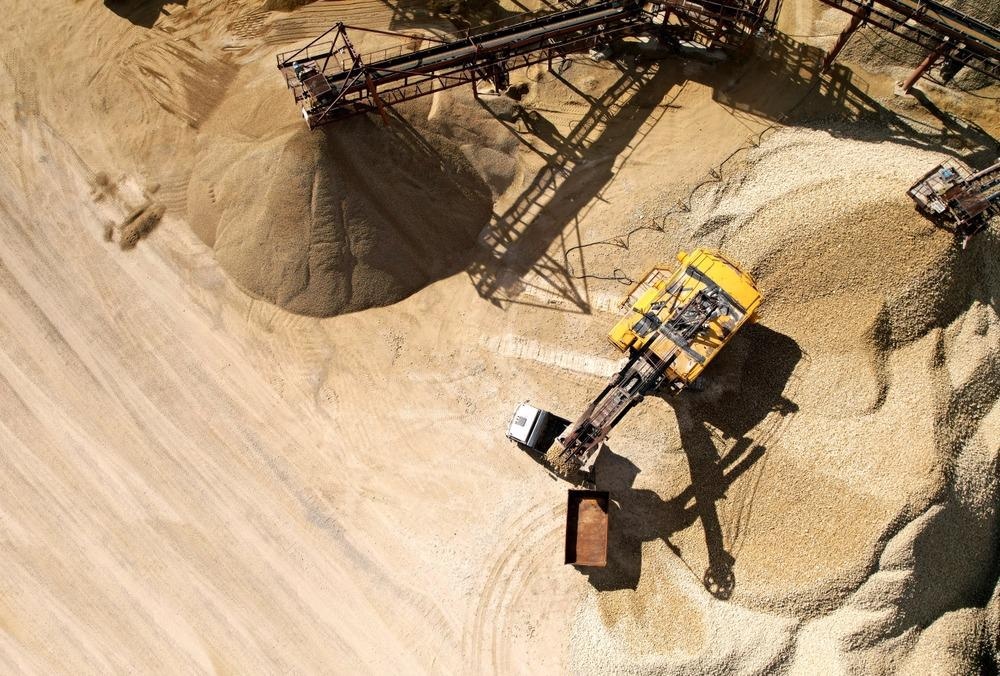Tackling the sustainability of mining is one of the key challenges facing the industry in the 21st century. Reducing mining waste and reusing valuable resources is a central element of the industry’s shift toward a circular economy-based approach which will reduce mining’s environmental impact. Recently, research has been conducted on a valuable waste stream: sustainable ore-sand.

Image Credit: Maksim Safaniuk/Shutterstock.com
Tackling Mining Waste
Mining is a vital economic activity for many countries. With the huge amount of waste generated and the carbon emissions caused by extracting and processing valuable mineral resources, there is significant room for improving the sustainability of mines. Valuable mining waste is disposed of, losing resources that could otherwise be recycled and reused for numerous industrial applications.
Approximately fifty billion tons of sand are used annually to meet the demands of a rapidly urbanizing society and growing population. After water, sand is the most exploited natural resource in the world. This valuable raw material is used in concrete, asphalt, and for the manufacture of glass and electronics chips. Substituting sand, which is a virgin, non-renewable resource, with sustainable alternatives will solve several issues.
Mineral waste produced by mining ores is the largest global waste stream. It is estimated that between thirty and sixty billion tons of mineral waste are generated annually. Recycling and reusing mineral waste could be hugely beneficial for the mining industry, providing value-added products for sectors such as construction.
What is Sustainable Ore-Sand?
Achieving a step-change in mineral processing is advantageous for the industry as it valorizes commercially useful products and reduces the vast waste streams generated annually by mines worldwide. It would drastically improve the sustainability of mining operations and provide an economically valuable product stream. Mining tailings can be utilized to produce sustainable sand.
Researchers have dubbed this product “ore-sand” which can be utilized as an alternative construction material for infrastructure projects and domestic and commercial buildings. Recycled aggregate materials are a key strategy for reducing the environmental impact of the global construction industry.
According to the researchers, sustainable ore-sand used as a recycled aggregate material could potentially replace up to one billion tons of sand in China, one of the largest consumers of this vital natural resource in the world. Lifecycle assessments have indicated that the use of this sustainable resource has the potential to provide a net carbon emission reduction in sand production processes.
Research has demonstrated characteristics such as non-toxicity, inertness, and mechanical and physical properties of this material, making it a suitable building material to meet the demands of a burgeoning world population. Several applications can benefit from the use of sustainable ore-sand, including embankments, pavements, and cement manufacture.
A No-Tailings Mining Model
Tailings can hinder mining operations and present environmental concerns. Replacing sand production with ore-sand has the potential to significantly reduce global mining tailings.
In the research, the team mapped global mining locations and modeled the global consumption of sand. It was demonstrated that one-third of mines could find a local demand for ore-sand.
Meeting the demand with this sustainable material reduces mining tailings by 10%, providing significant advantages to mining operations. A total of 50% of the global sand industry could locally source ore-sand.
Developing nations could utilize ore-sand as a valuable resource stream. Whilst their options for using recycled aggregate materials may be limited, developing nations undertake mining activities, which means that there is a steady stream of mining tailings, reducing mining waste and the environmental impact of this vital economic activity.
Evaluating the Real-World Application of Ore-Sand
Vale, a global mining company headquartered in Brazil, has contributed to the development of ore-sand in a Brazilian project. The project has incorporated it into all four pavement layers of a road, which will be assessed over a two-year period, with temperature, pressure, humidity and deformation sensors employed to monitor its performance.
Laboratory tests conducted over a five-year period have indicated a 20% cost reduction and 50% lifespan increase compared with conventional road construction materials, including sand.
A total of 7,000 tons of mine tailings are consumed per kilometer. Around 250,000 tons of sustainable ore-sand have been processed and sold since 2021. Vale currently maintains the Pico Block Factory to produce sand from mine tailings.
Mitigating the Environmental Impact of the Global Mining Industry
Innovative solutions improve the industry’s sustainability and mitigate the vast environmental impact of mining operations.
Reducing mining tailings and waste and the removal of sand from the environment, as well as providing an environmentally friendly and sustainable industrial material, ore-sand is just one of the solutions currently being explored by researchers.
References and Further Reading
Vale (2022) Sand produced by Vale is a solution to sand sustainability and mining tailings reduction, according to universities [online] vale.com. Available at: http://www.vale.com/EN/aboutvale/news/Pages/study-about-sustainable-sand-in-mining.aspx
Mining.com (2022) Ore-sand: a sustainable source of sand that reduces mine waste [online] mining.com. Available at: https://www.mining.com/ore-sand-a-sustainable-source-of-sand-that-reduces-mine-waste/
Mining.com (2021) Mineral ores may help prevent sand sustainability crisis [online] mining.com. Available at: https://www.mining.com/mineral-ores-may-help-prevent-sand-sustainability-crisis/
Disclaimer: The views expressed here are those of the author expressed in their private capacity and do not necessarily represent the views of AZoM.com Limited T/A AZoNetwork the owner and operator of this website. This disclaimer forms part of the Terms and conditions of use of this website.